
AI-driven HR tools are transforming hiring for small businesses, cutting timelines by 65% and offering efficient, cost-saving solutions. From automating resume screening to simplifying compliance, these systems help small teams compete effectively with larger firms. Here’s a quick look at 10 standout platforms:
These tools reduce repetitive tasks, enhance decision-making with data, and ensure compliance with hiring laws. Whether you’re looking for affordability, automation, or advanced features, there’s a platform tailored to your needs. Keep reading to find the best fit for your business.
Small businesses often grapple with unique hiring challenges: limited budgets, tight deadlines, and HR tasks usually managed by just one person. AI HR systems are stepping in to transform these processes, streamlining repetitive tasks and offering data-driven insights. The result? Small businesses can compete more effectively with larger companies by saving time, cutting costs, and making smarter decisions.
AI takes the hassle out of time-consuming tasks like resume screening, which can now be completed in minutes by matching candidates to job requirements automatically. Even scheduling interviews becomes a breeze, thanks to AI-powered chatbots that handle back-and-forth communication and address common applicant questions.
"When it comes to HR, one of the areas that has seen the biggest transformation is in talent acquisition. The newest tools are fast, powerful, and adapt to hiring managers' needs, which is critical in today's labor market."
- Alison Stevens, Senior Director of HR Solutions, Paychex
For small businesses, the financial impact of AI is undeniable. A whopping 86% of small businesses report improved profit margins, with productivity gains reaching up to 40% through automation. These efficiency boosts directly reduce labor costs, which explains why 98% of small businesses now rely on AI tools.
Gone are the days of relying on gut feelings for hiring. AI systems gather real-time performance data, empowering small business owners to make well-informed decisions about talent management. This approach enhances hiring strategies, making them more accurate and effective.
The adoption of AI in HR isn’t just a win for businesses - it’s welcomed by employees too. About 74% of employees feel comfortable with AI handling HR processes. While sensitive matters still require a personal touch, AI’s efficiency in managing routine tasks is widely appreciated.
"There is FOMO about not using AI. However, I think businesses know that if they don't adopt technology, they could get wiped out."
- Beaumont Vance, Senior Vice President of Data, Analytics, and AI at Paychex
AI doesn’t just streamline processes - it reshapes hiring into a strategic advantage. These systems refine job descriptions, target the right candidates, and even enhance onboarding by ensuring new hires receive tailored training and resources automatically. This reduces the time managers spend on repetitive tasks. Starting small, like automating document generation, can pave the way for broader AI adoption.
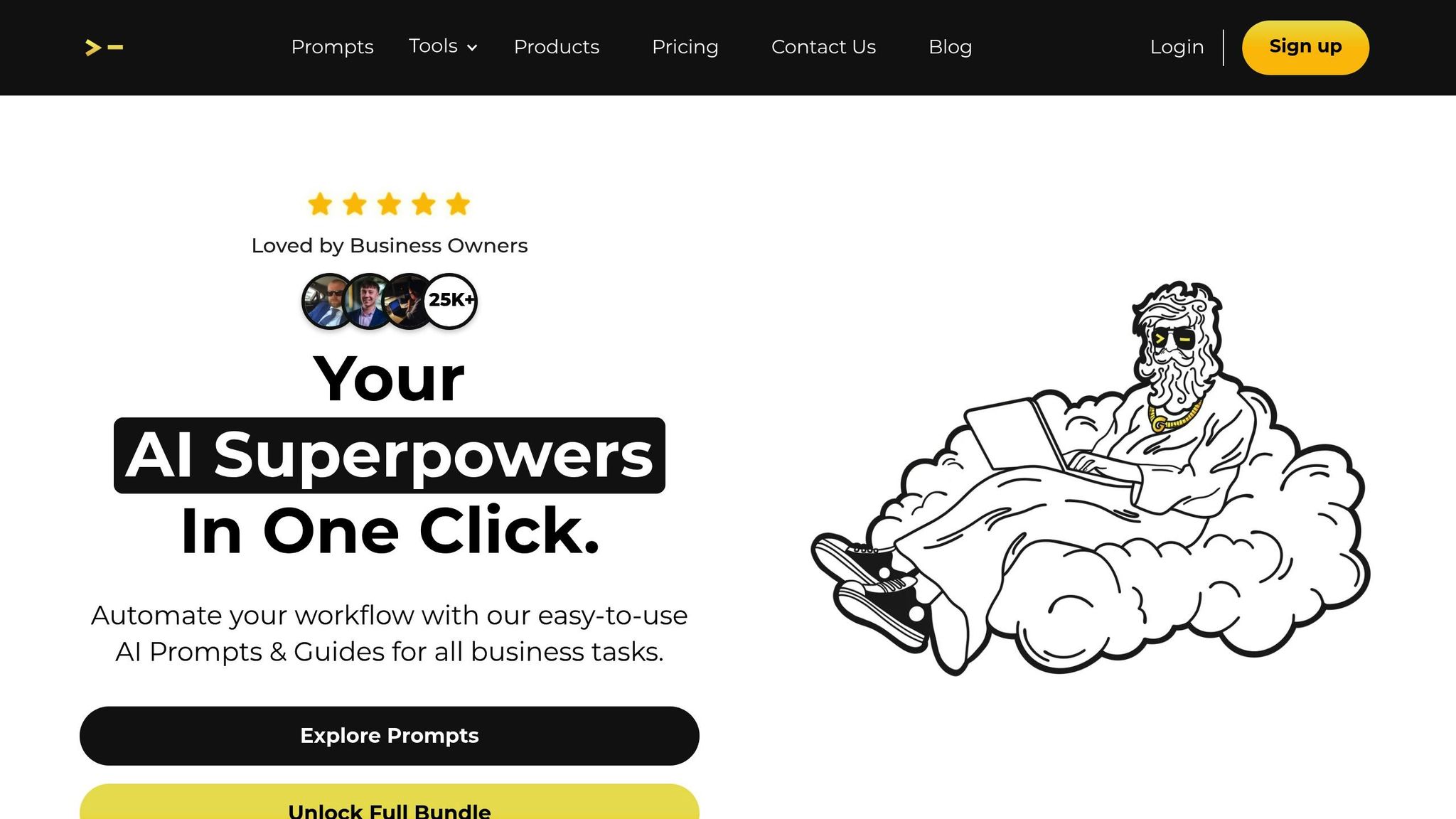
God of Prompt is transforming HR for small businesses by automating tasks through advanced prompt engineering. This AI-powered platform offers tailored ChatGPT prompts designed to streamline recruitment and other human resources processes.
The platform simplifies recruitment by using prompts to automate tasks like candidate screening, crafting precise job descriptions, and analyzing applicant data. With a focus on detailed and context-aware prompts, God of Prompt empowers small business owners to improve hiring strategies, strengthen team communication, and create structured training materials for onboarding new hires.
What makes God of Prompt stand out is its ability to teach users how to craft highly specific, context-driven prompts. This ensures more accurate results when screening candidates or generating HR documents. For small businesses, this precision is a game-changer, enabling them to operate more efficiently without compromising the quality of their hiring processes.
Beyond recruitment, the platform supports decision-making in areas like crisis management and competitive analysis. By enabling tone and style customization, it helps businesses maintain their unique brand voice throughout the hiring journey. These features are particularly valuable for small businesses navigating the challenges of limited resources and expertise in HR.
God of Prompt directly addresses a key issue for small businesses: limited HR resources. It provides ready-to-use prompts that can be applied immediately, making it an ideal solution for entrepreneurs juggling multiple responsibilities and looking for efficient ways to manage HR tasks.
The platform’s flexibility allows businesses to start small - automating simple tasks like writing job descriptions or creating screening questions - and gradually expand to more complex uses as they grow comfortable with the system. This step-by-step approach aligns well with the cautious adoption style often seen in smaller companies.
For those already using ChatGPT or similar AI tools, God of Prompt offers a structured way to get better results. Instead of relying on generic AI-generated responses, users gain access to proven prompt templates that ensure consistent, professional outcomes across HR functions. By simplifying HR workflows, the platform helps small businesses overcome challenges like limited expertise and tight resources, delivering practical and effective solutions.
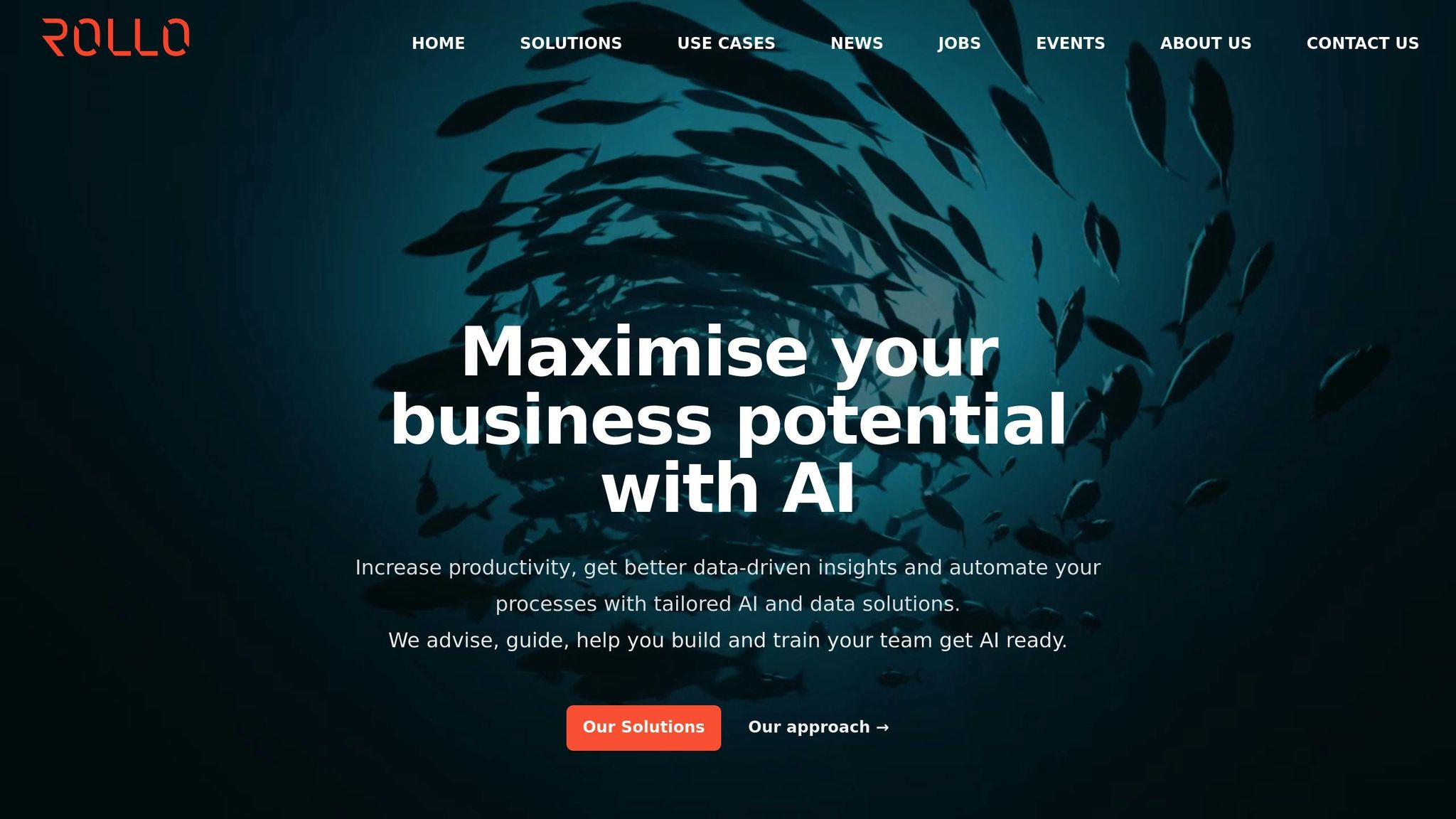
Rollo AI integrates artificial intelligence directly into its HR platform, offering a secure and efficient way to simplify hiring and other HR processes. It prioritizes data security and avoids the hassle of complicated integrations.
The Rollo Co-Pilot brings data-driven insights to hiring, helping predict turnover risks and improve employee engagement. It also takes care of repetitive tasks like auto-filling forms, generating compliance reports, and managing HR-related responsibilities - perfect for businesses without dedicated HR teams.
But Rollo AI doesn’t stop at hiring. It also tackles everyday operational tasks. For example, its AI-powered chat assistant answers common employee questions about benefits, company policies, and onboarding. Additionally, its expense management system scans receipts, extracts essential details, flags policy violations, and even auto-approves expenses that meet company guidelines.
Rollo AI ensures smooth payroll operations by syncing approved expenses automatically, reducing manual data entry and ensuring employees are reimbursed on time. The platform also stays up-to-date with U.S. regulations, such as the latest IRS mileage rates, so businesses remain compliant without extra effort.
Rollo AI’s features are tailored to address the unique challenges faced by small businesses. For instance, 39% of small businesses already use AI tools, and 53% are planning to expand their investments in AI-powered HR solutions. By simplifying HR processes and ensuring compliance with U.S. regulations, Rollo AI boosts efficiency - something every small business can appreciate.
Paychex Flex is an all-in-one HR platform with roots in over 50 years of payroll expertise. Trusted by nearly 800,000 businesses across the U.S., it combines payroll, HR, and benefits management into one streamlined solution, making it a go-to option for small businesses. Let’s dive into what makes it stand out.
Paychex Flex leverages AI to simplify repetitive HR tasks. Employees can use self-service tools to access their records, request time off, or update personal details without needing to go through HR. On the backend, the platform automates tax administration, ensuring compliance with federal, state, and local laws. This reduces the administrative load for business owners and minimizes the risk of costly mistakes.
Paychex Flex offers flexible pricing options to suit various business needs:
This tiered pricing approach ensures businesses only pay for what they need, with the option to scale as they grow.
One of Paychex Flex’s biggest strengths is its ability to integrate payroll, HR, and benefits into a single system. This eliminates the need for juggling multiple software tools, reducing errors and saving time. The platform also automates tax filing and compliance tasks, further streamlining operations.
Greg Duffy, owner of Super Seal Sealcoating Company, has been a Paychex client for over three decades. He credits the platform’s integrated approach with simplifying his business processes and reducing worries about tax-related errors.
Small businesses often operate with limited resources and wear multiple hats. Paychex Flex addresses these challenges head-on. Its unified system and flexible pricing help small businesses stay compliant, accurate, and productive. This is especially critical when you consider that 50% of data breaches target companies with fewer than 1,000 employees. By combining payroll accuracy, HR compliance, and productivity tools, Paychex Flex offers a solution that’s both efficient and practical for small businesses.
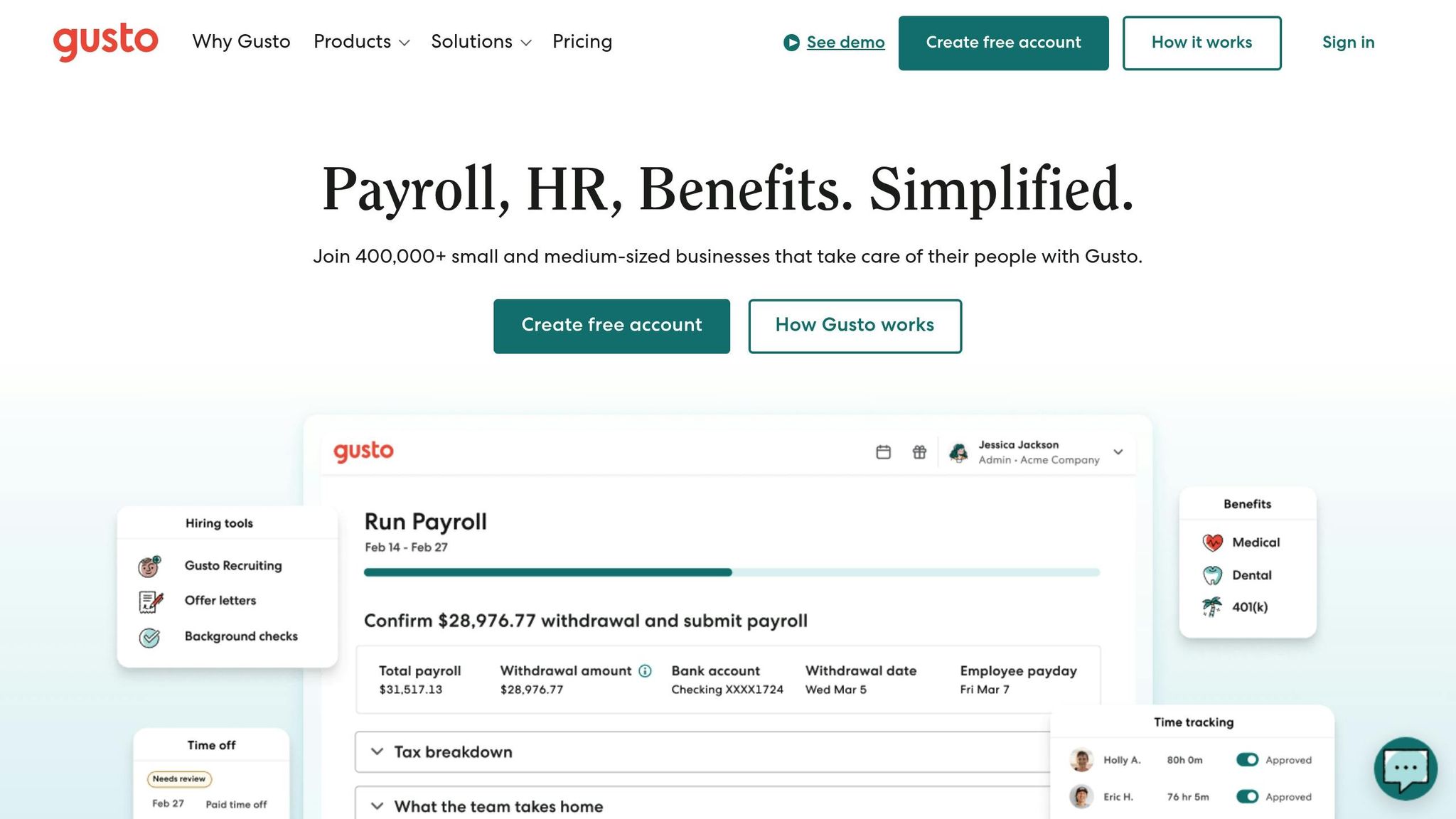
Gusto supports over 400,000 U.S. businesses by combining AI-driven recruiting tools with streamlined payroll and benefits management. This all-in-one platform is designed to be both efficient and budget-friendly, making it an excellent choice for small businesses.
Gusto uses AI to simplify and enhance the hiring process. Its Applicant Tracking System (ATS) efficiently screens candidates, while the Job Post Generator crafts tailored job descriptions. Once the job is posted, Gusto ensures it reaches top job boards to attract qualified applicants. The platform also automates onboarding by preparing offer letters and checklists, making it easier for businesses to welcome new employees. These tools, paired with Gusto's affordable pricing, provide a seamless recruitment experience.
Gusto offers flexible pricing plans to suit various needs:
A limited-time offer provides a 60% discount for the first three months if payroll is initiated by August 31, 2025.
Gusto integrates smoothly with U.S. payroll systems, offering automated tax calculations and filings, state tax registration, and time-tracking synchronization. It also manages a variety of benefits, including health insurance, FSAs, 401(k) plans, commuter benefits, and workers' compensation. Additionally, Gusto connects with accounting tools like QuickBooks and Xero, making it a comprehensive solution for small business HR needs.
"My favorite thing about Gusto is the compliance aspect. They make quarterly taxes, onboarding, and everything else so simple and easy, which saves me a ton of time."
- Luke Henke, Accounting Manager at Amplio Digital LLC
Gusto helps small businesses save time - up to 4 hours per month on payroll tasks and as much as 100 hours annually on tax and compliance work. Its straightforward interface has earned praise from users like Brian Leimone, CEO of Print Express Enterprises, Inc.:
"Gusto is super simple and easy to use. I've used multiple other payroll processes and there's nothing like this out there."
With 9 out of 10 customers recommending Gusto and 88% agreeing that it keeps them compliant with regulations, this platform addresses key challenges faced by small businesses, combining advanced hiring tools with robust HR management to deliver meaningful results.

BambooHR is an HR management system tailored for small and medium-sized businesses, now enhanced with advanced AI capabilities. Recognized as the #1 rated HR software in 2024 with a 4.4 out of 5 rating from 2,344 reviews, BambooHR stands out for its AI Agent, which uses machine learning and natural language processing to handle routine HR tasks and provide actionable insights.
BambooHR’s AI Agent simplifies hiring and onboarding processes by automating tasks like resume screening, compliance monitoring, scheduling, and document management. By taking care of these repetitive duties, HR teams can focus on more strategic priorities. The onboarding process is particularly efficient, ensuring all compliance documents are completed and up-to-date.
The platform starts at $10 per employee per month, with tiered plans and volume discounts available. Bundled solutions offer an additional 15% savings, and a 7-day free trial allows businesses to explore its capabilities. This pricing aligns well with BambooHR’s extensive integration options.
BambooHR connects seamlessly with its payroll solution and over 150 pre-built integrations. These integrations automatically sync key data such as employee records, PTO, location changes, and benefits information. The system also supports tax and compliance functions, making it a comprehensive choice for businesses.
"BambooHR Payroll is designed to handle multi-state taxation in terms of income and withholding. When adding a state in the system, it starts prompting you where to go to register and how to set it up. It's easy for novices and experts to navigate and activate! I love BambooHR."
- Jonathon Bartlett, Chief Human Resources Officer at Indica Labs
By streamlining payroll processes, BambooHR saves HR teams up to 3 hours per payroll run. Additionally, its Zero Trust security model ensures sensitive data is protected, reinforcing its reliability for small businesses.
BambooHR delivers tangible time and cost savings by automating labor-intensive HR tasks. Customers report saving hundreds of hours and reducing HR costs by 40%. For instance:
"BambooHR and payroll together have saved me almost 20 hours a week. We've honestly saved $20,000 over a year."
- Rachael Schau, Chief of Staff at Rockford Silk Screen Process
Another success story comes from Lisa Marino, HR Manager at Avidbots, who noted that automating time-off management freed up $40,000 worth of capacity to support more employees. One company even reduced a 3-week benefits administration process to just 2 days. Users frequently highlight the platform’s intuitive interface and responsive customer support. The AI Agent also helps employees find answers to common questions quickly, lightening the administrative load for HR teams.
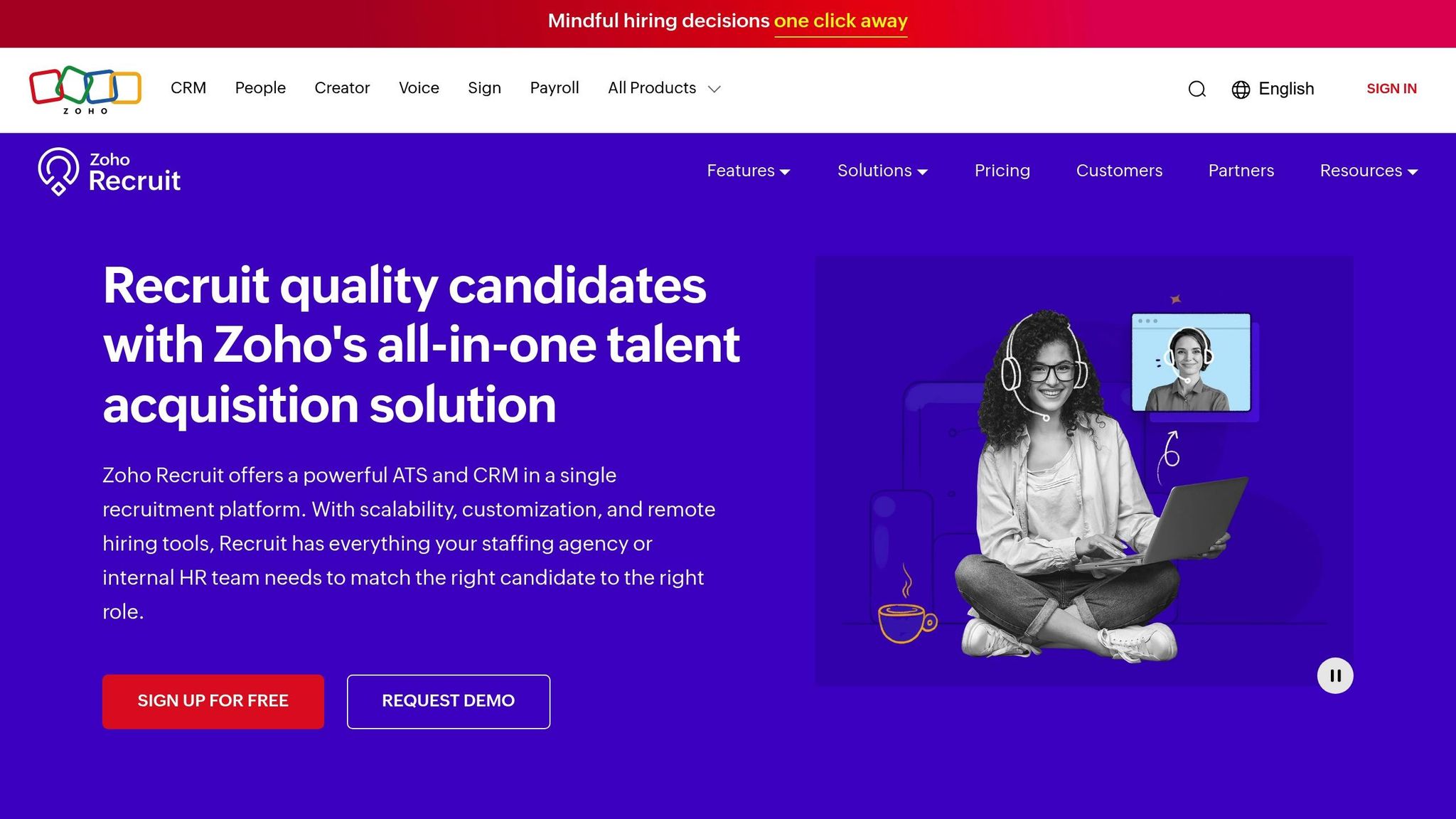
Zoho Recruit is an AI-powered recruitment platform designed to simplify hiring for small businesses. By using machine learning, it helps match candidates to job profiles, cutting down on bias and improving hiring efficiency. With over 45,000 businesses and more than 1 million users relying on its tools, Zoho Recruit has become a trusted solution for managing the hiring process.
Zoho Recruit offers a range of AI-powered tools that make hiring faster and easier:
Zoho Recruit provides flexible pricing options to suit small business budgets:
"It provides a robust set of functionalities at competitive pricing, making it a cost-effective choice for startups and small businesses."
- Gregory H, President, Education Management
These pricing plans, combined with seamless integration options, make Zoho Recruit a practical choice for small businesses.
Zoho Recruit integrates effortlessly with Zoho People and Zoho Payroll, eliminating duplicate entries and ensuring compliance. The system syncs employee data, automates pay period setups, and handles tax deductions in line with federal and state regulations. Employees can access digital payslips and track reimbursements through a self-service portal. Additionally, Zoho Recruit connects with tools like Microsoft 365, Google Workspace, and Zapier, making it easy to incorporate into existing workflows.
Zoho Recruit stands out as a flexible solution for small businesses across various industries. The Forever Free plan offers a risk-free way to test its features, while the Standard plan delivers everything most businesses need for efficient hiring.
"Zoho Recruit was our first ATS and came in right from the start. Over the years we've reviewed loads of other options and have started using other recruitment tech, but on the ATS front Zoho Recruit has proven tough to beat."
- Jakob Thusgaard, Founder & CEO, YourSales, Netherlands
With an average cost-effectiveness rating of 4.5 out of 5 - higher than the recruiting software category average of 4.4 - Zoho Recruit is highly regarded by users. Its automation features, like pre-screening questionnaires and bulk email tools, help small businesses save time on repetitive tasks.
"One of the standout benefits for me is the ability to explore and use the platform without needing to pay for a subscription right away."
- Nikka L, Growth Strategist, Staffing and Recruiting
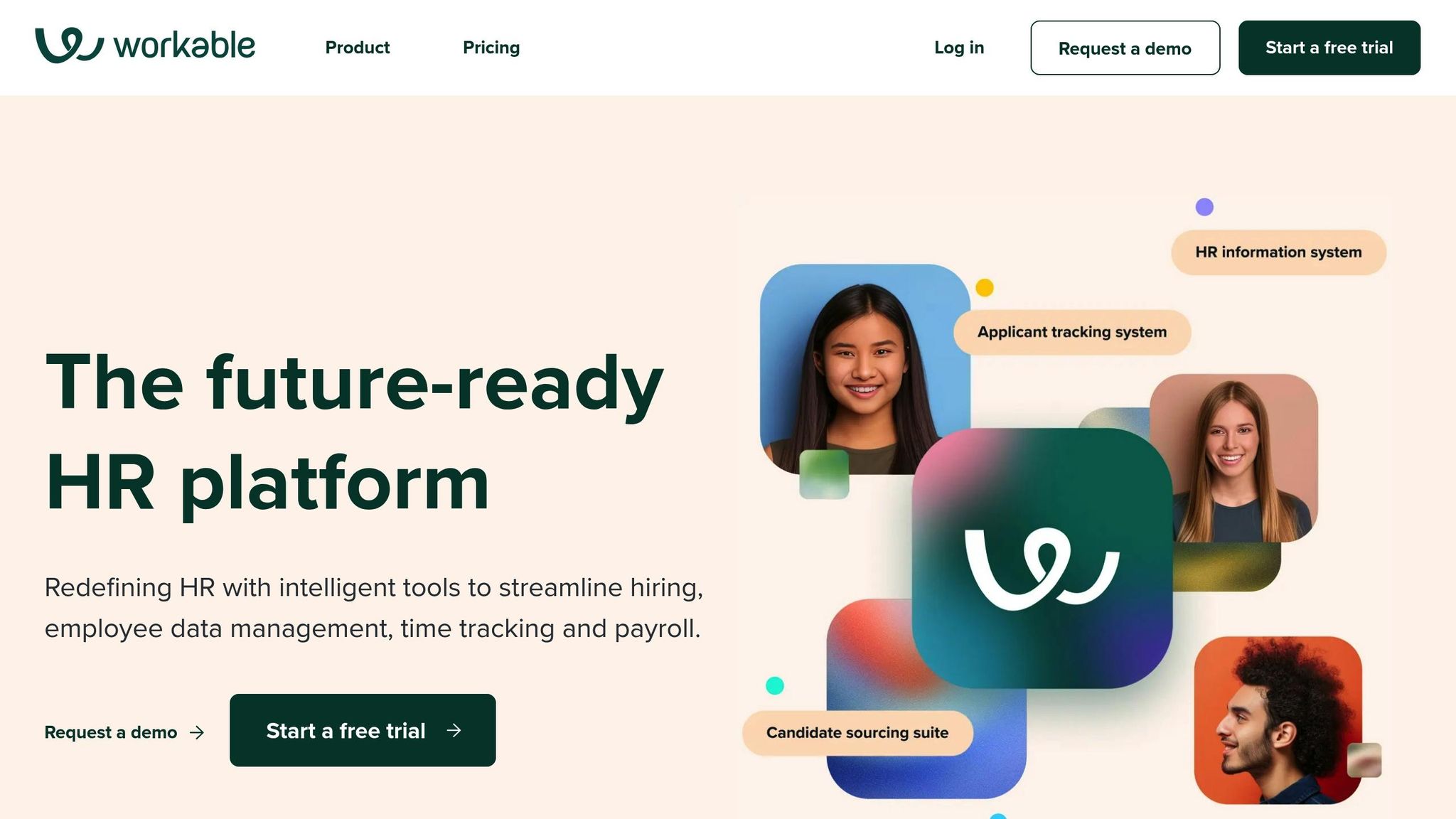
Workable simplifies the hiring process for small businesses by automating essential recruiting tasks. Acting like a virtual recruiter, this AI-powered platform handles everything from sourcing candidates to scheduling interviews. With access to millions of job listings across various industries, Workable tailors its approach to meet the unique requirements of different roles.
Workable leverages AI to streamline hiring workflows. Its screening tools quickly evaluate candidate experience, allowing managers to focus on top prospects. The platform accesses over 400 million profiles, auto-generates personalized outreach emails, and includes a self-service scheduler that syncs with team calendars. Additionally, Workable assists in creating job descriptions, salary ranges, interview kits, and scorecards, making it a comprehensive tool for hiring teams.
Workable offers flexible pricing plans designed to accommodate businesses of different sizes:
Add-ons: Starter Plan add-ons include texting ($49/month), video interviews ($59/month), and assessments ($39/month). Standard Plan add-ons are priced at $79/month for texting, $99/month for video interviews, and $59/month for assessments.
Workable integrates seamlessly with major U.S. payroll systems, creating a unified HR workflow. For example, it connects with ADP Workforce Now to sync employee records and time-off data through custom field mapping. For businesses using Paylocity, the platform exports candidate details to set up onboarding records, though these integrations may involve additional fees. Workable also works with BambooHR, automatically generating employee profiles when candidates are hired, ensuring a smooth transition from recruitment to HR management.
Workable's features and pricing make it a strong option for growing small businesses, though startups might find the pricing less accessible. A 15-day free trial provides full access to Standard Plan features, allowing businesses to post jobs to over 200 job boards, schedule interviews, and collaborate with team members.
For small businesses without dedicated HR teams, Workable's automation tools are especially helpful. It handles candidate screening, job content creation, and interview scheduling, freeing up time for owners to focus on strategic decisions. The platform also taps into a database of over 400 million profiles, offering access to talent pools that might otherwise require expensive recruiting agencies. To make the most of Workable, businesses should ensure it integrates well with their existing HR systems, train staff on its tools, and review security measures for connected platforms.
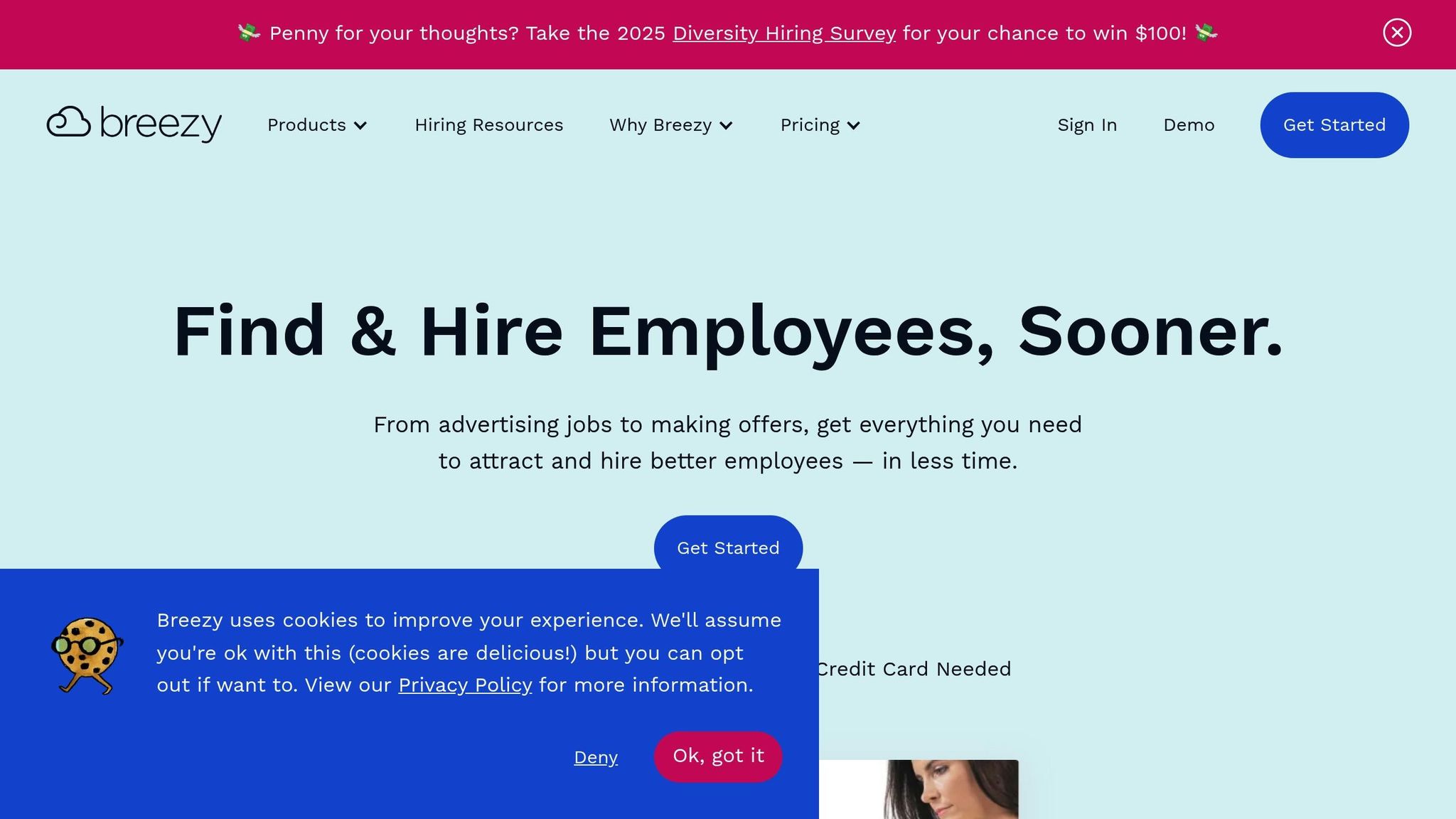
Breezy HR simplifies hiring for small businesses by combining a visual pipeline with automation tools. This platform is designed to help small teams manage multiple job openings efficiently while keeping the hiring process organized and straightforward.
Breezy HR takes care of time-consuming recruitment tasks through automation. It posts job openings to over 50 job boards simultaneously, saving users from having to manually upload listings on each site. The platform also ranks applicants based on customizable criteria, streamlining candidate evaluation. With its self-scheduling feature, candidates can book interviews directly through the system, which syncs with team calendars to avoid scheduling conflicts. Higher-tier plans include additional perks like automated reference checks and integrated live video interviews. Plus, Breezy HR provides real-time analytics and reporting, giving businesses instant insights into hiring trends and potential bottlenecks. These features make it a flexible solution for businesses with varying needs.
Breezy HR offers several pricing options to suit different budgets and requirements:
Annual plans come with two months free. Add-ons are also available, such as SMS/Text Messaging starting at $41 per month, Candidate Match Score beginning at $35 for a single position or $137 per month for subscriptions, and Incognito Apply at $137 per month.
Breezy HR integrates seamlessly with major U.S. payroll and benefits platforms, including Gusto, ADP Run, ADP Workforce Now, Paylocity, Rippling, and Trinet. These integrations allow for automatic transfer of candidate data into payroll systems, eliminating duplicate data entry. For example, the Gusto integration lets businesses manage payroll and benefits in one place while ensuring accuracy from hiring to onboarding. Similarly, with ADP Run, Breezy HR can automatically create new employee records using candidate information. The platform also works with BambooHR, making it easy for small and medium-sized businesses to securely organize employee data.
As one user shared:
"Breezy has everything, plus integration… you have everything you need, and it's very simple too." - Martin Marlatto
Breezy HR’s combination of competitive pricing, automation, and integrations makes it a great fit for small businesses. The free Bootstrap Plan is perfect for startups or companies with minimal hiring needs, while the Startup Plan is ideal for growing businesses that need tools for managing unlimited job postings and candidate pools. The platform’s visual pipeline is particularly helpful for business owners without HR experience, as it clearly shows each candidate’s progress. This reduces the learning curve and ensures no qualified applicant slips through the cracks. For businesses without dedicated HR staff, Breezy HR’s automation handles routine tasks like job posting and initial screening, freeing up time for owners to focus on interviews and key hiring decisions.
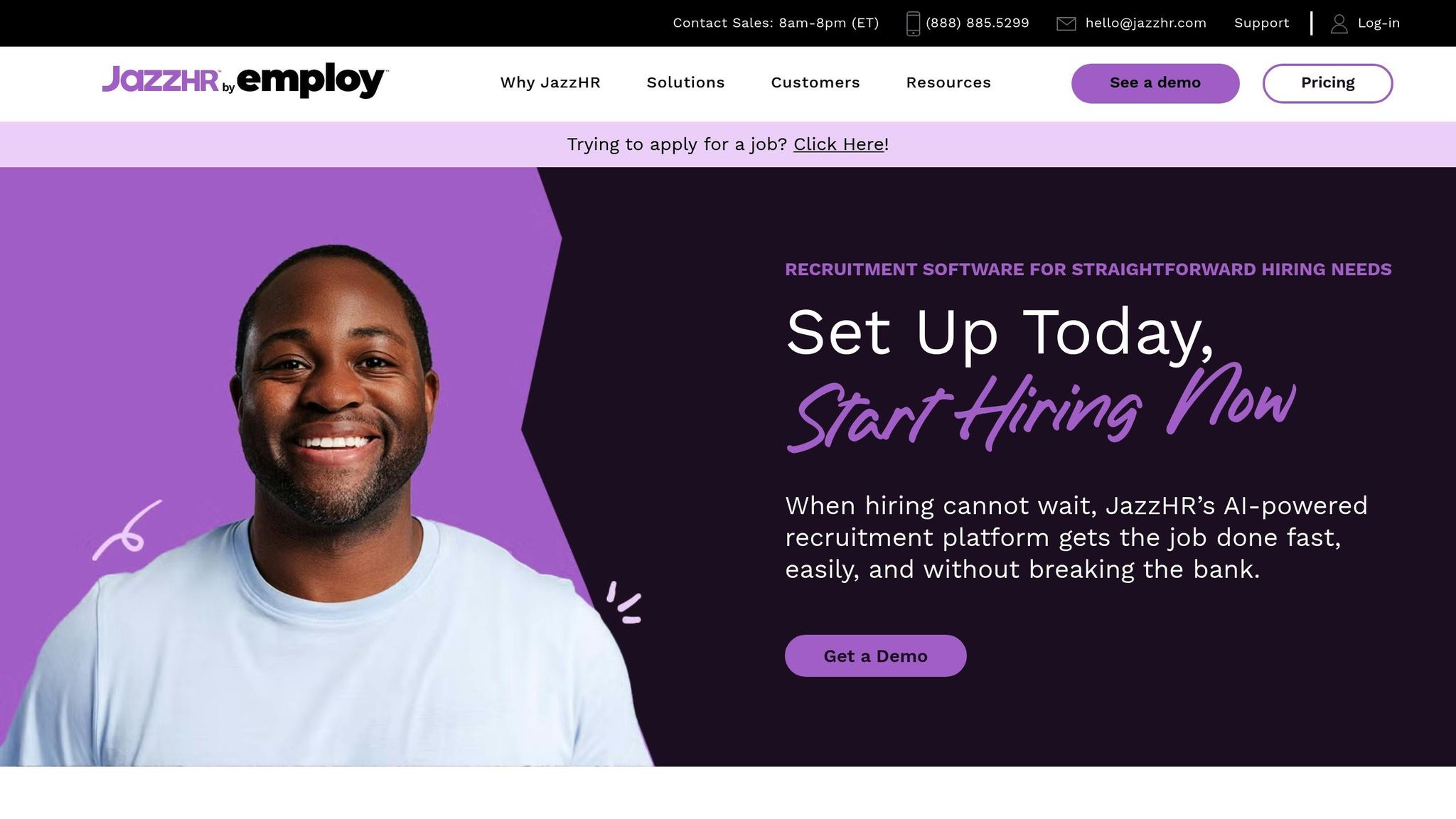
JazzHR is a recruitment platform tailored for small to mid-sized businesses, designed to simplify and modernize hiring processes. By replacing manual spreadsheets and scattered email workflows, JazzHR helps businesses stay organized and efficient throughout the recruitment journey.
JazzHR offers a range of automation tools to streamline hiring. It can post job openings across multiple boards, screen candidates using customizable criteria, and schedule interviews with integrated calendars and automated reminders. The platform also provides real-time reporting, allowing businesses to identify and address hiring bottlenecks quickly.
JazzHR has three pricing tiers, with annual billing offering notable savings:
One user highlighted JazzHR's affordability, saying:
"The cost of using JazzHR is so incredibly reasonable that should not be a block for any company when considering using the system." - Nanette M Carvalho C., Consultant, Human Resources
JazzHR integrates seamlessly with payroll providers like Gusto and Justworks, enabling automatic import of candidate data for onboarding. This reduces duplicate data entry and minimizes errors. In March 2024, JazzHR introduced its integration with Justworks, allowing users to pre-populate new hire information, making the onboarding process even smoother.
"Integrating ATS, Payroll, and HR systems creates a cohesive ecosystem that allows information to flow smoothly across systems and processes. This integration significantly boosts the employee experience, cultivating loyalty through streamlined processes." - Team JazzHR
JazzHR offers transparent pricing that scales with hiring demands, making it a practical choice for small businesses. Its automation tools save time, allowing business owners to focus on strategic decisions and building relationships with candidates. With a value-for-money rating of 4.13 out of 5, JazzHR provides an efficient and budget-conscious solution. However, the requirement for annual billing may not suit all users. Next, we’ll explore Lever, another tool designed to enhance hiring efficiency for small businesses.
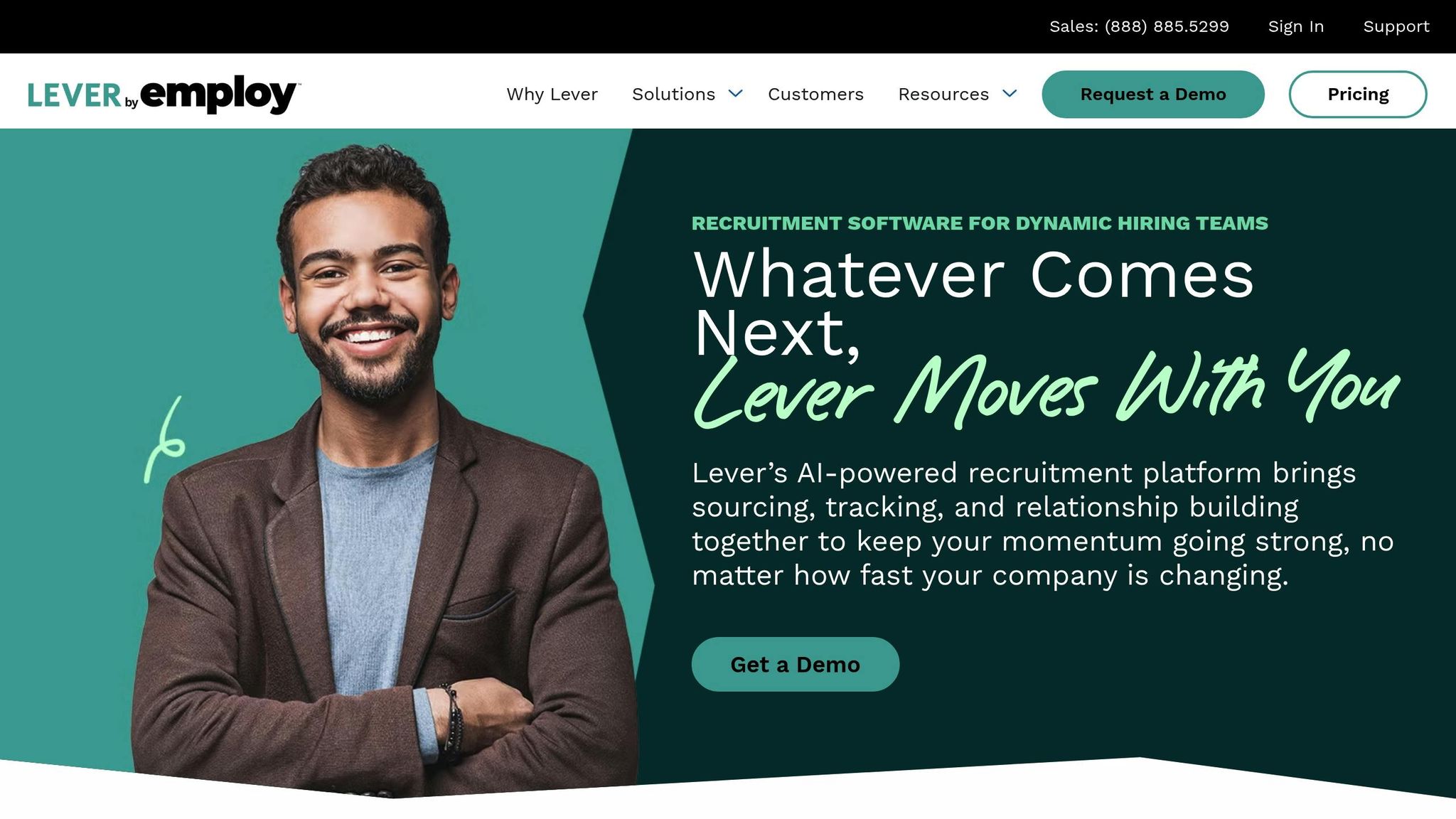
Lever is a hiring platform that blends Applicant Tracking System (ATS) and Customer Relationship Management (CRM) tools to help small businesses manage recruitment more efficiently. Its focus is on simplifying workflows and making the hiring process more organized.
Lever's pricing is tailored to each business, depending on the features selected and the company's size. It offers two primary plans: LeverTRM for small to medium-sized businesses and LeverTRM for Enterprise for larger organizations. On average, businesses spend about $15,967 annually on Lever, with costs ranging from $6,893 to $48,804. Entry-level plans typically cost between $200 and $300 per month, or roughly $15 to $75 per user monthly. Companies often save about 16% by negotiating their pricing.
Lever works seamlessly with a variety of HRIS and payroll systems, ensuring an easy transition from recruitment to onboarding. Its network of partners, which includes tech providers and HR services, makes it compatible with many common U.S. business tools. This integration helps small business owners avoid the hassle of manually transferring candidate data.
The LeverTRM plan is specifically designed to address the needs of small and medium-sized businesses. It offers scalable tools that adapt as hiring requirements grow. By combining ATS and CRM capabilities, Lever helps businesses build and maintain a strong talent pipeline, making it a strategic tool for long-term recruitment goals.
To help you navigate the benefits of AI in HR, here’s a detailed comparison of seven AI-powered HR systems. This table outlines key features, pricing, payroll integration, and suitability for small businesses, while also noting potential limitations. Each solution caters to different hiring needs, making it easier to identify the best fit for your business.
| System | Key AI Features | Monthly Pricing (USD) | Payroll Integration | Small Business Fit | Limitations |
|---|---|---|---|---|---|
| God of Prompt | Provides over 30,000 AI prompts for recruitment, including templates for candidate screening and interview creation | $0–$150 (one-time) | Compatible with major payroll systems via prompt templates | Excellent – scalable pricing and extensive resources | Requires manual setup of prompts |
| Paychex Flex | Features AI-powered candidate sourcing, automated compliance checks, and predictive analytics | $59/month + $4/user | Native payroll integration | Ideal for small businesses | Limited AI capabilities compared to specialized tools |
| Gusto | Offers smart candidate recommendations, automated onboarding workflows, and compliance monitoring | $49/month + $6/user | Built-in payroll processing | Ideal for small businesses | Lacks advanced AI analytics |
| BambooHR | Includes performance prediction AI, employee engagement analytics, and automated scheduling | Custom pricing (contact vendor) | Integrates with 100+ payroll providers | Good – scalable with flexible pricing | Pricing lacks transparency |
| Zoho Recruit | Covers AI candidate matching, automated interview scheduling, and predictive hiring analytics | $30–$65/user/month | Integrates with Zoho Payroll and third-party systems | Good – affordable with strong features | Best value when paired with the full Zoho suite |
| Workable | Features AI-powered sourcing, automated candidate screening, and bias reduction algorithms | $169–$599/month | Integrates with major payroll systems | Fair – higher cost for smaller teams | Expensive for businesses with fewer than 20 employees |
| Lever | Provides CRM-style candidate tracking, predictive pipeline analytics, and workflow automation | $200–$300/month | Extensive HRIS and payroll partnerships | Good – strong support for growing businesses | Steeper learning curve |
This table highlights how these systems vary in features and pricing, offering insights to guide your decision-making. Pricing ranges from predictable monthly fees, like Paychex Flex at $59/month plus $4 per user, to scalable plans such as Zoho Recruit’s $30–$65 per user per month. For small businesses, affordability plays a crucial role, as noted by Stephanie Kochis, Owner/Bookkeeper of Savvy Steward Financial Services, LLC:
"Gusto seems to offer everything that [other payroll offerings] do, but at a much more affordable cost. Gusto's prices are much more reasonable for very small businesses and startup businesses."
Integration capabilities also vary significantly. Paychex Flex and Gusto provide native payroll processing, simplifying operations, while BambooHR boasts compatibility with over 100 providers. God of Prompt stands out for its massive library of HR-specific prompts, offering flexibility, whereas Zoho Recruit and BambooHR focus on embedding AI seamlessly into daily workflows with less customization.
Small business suitability often depends on team size and budget. For teams with fewer than 10 employees, God of Prompt’s resource-driven model or Gusto’s all-in-one solution can be excellent choices. Meanwhile, mid-sized businesses may appreciate the scalable features of Paychex Flex or BambooHR. Rapidly expanding companies might find Lever’s advanced pipeline management worth the higher cost.
While budget-friendly options may lack advanced AI features, premium platforms often come with a steeper learning curve. With two-thirds of employers now incorporating AI into hiring, choosing the right tool can make a significant impact on your hiring efficiency and overall workflow.
Small businesses often face hiring challenges that overwhelm HR teams with administrative tasks and slow down growth. Traditional recruitment methods can leave HR professionals buried in paperwork and concerned about compliance. AI-powered HR systems are changing the game, offering a smarter way for small businesses to streamline their hiring processes.
One of the biggest hurdles in small business hiring is the sheer amount of administrative work involved. According to Deloitte, HR professionals spend up to 57% of their time on these tasks.
AI tools step in by automating repetitive processes. For instance, they can quickly scan resumes, identify relevant keywords, and rank candidates based on their experience. This automation speeds up the hiring process and frees up HR teams to focus on more strategic tasks.
In July 2025, Paycor's Job Description tool, powered by Microsoft Azure's OpenAI Service, highlighted this efficiency boost. It reduced the time spent on crafting job descriptions by 90%, allowing HR teams to create tailored, role-specific descriptions in seconds. This not only saves time but also ensures consistency and compliance.
In today's competitive job market, speed is essential. With roles now taking over 36 days to fill on average and a 46% increase in applications since 2022, manual screening has become a bottleneck .
AI simplifies and accelerates hiring by handling multiple tasks simultaneously. While traditional hiring follows a step-by-step approach - posting jobs, waiting for applications, screening resumes, and scheduling interviews - AI can manage these tasks all at once. It can source candidates, send personalized outreach messages, and pre-screen applicants in a fraction of the time.
Machine-learning algorithms also help match candidates' skills to job descriptions, ensuring qualified applicants don’t get lost in the shuffle. This allows small businesses to compete with larger companies by responding quickly to top talent.
AI doesn’t just speed up hiring - it also improves the quality of candidates selected. By analyzing past hiring data, AI predicts which applicants are most likely to thrive in specific roles.
AI-driven assessments evaluate skills like coding, language proficiency, and cognitive abilities, adapting in real time based on candidates' responses. Video interviews analyzed by AI can even assess traits like communication style and alignment with company values.
A notable example is Unilever, which revamped its hiring process using AI-powered video interviews and predictive analytics. This approach reduced hiring time, increased diversity, and created a more efficient selection process. For small businesses, these tools make advanced candidate evaluation accessible without needing a large HR budget.
AI also addresses bias in hiring by focusing on skills and qualifications rather than personal details. It can analyze job descriptions to eliminate biased language before posting, helping attract a more diverse pool of candidates.
According to SHRM, 65% of HR professionals now use AI to create job descriptions, 42% use it to customize job postings, and nearly 33% rely on it for resume screening. These tools help standardize evaluations and reduce subjective decision-making.
That said, fairness requires vigilance. Regular audits of AI-driven decisions are essential to catch and correct any biases in the system.
Compliance with employment laws can be tricky for small businesses without dedicated legal teams. AI systems simplify this by automating compliance checks and maintaining accurate records.
These tools ensure adherence to key regulations like Title VII, ADA, ADEA, and the Equal Pay Act, as well as state-specific mandates in places like Colorado, Illinois, and New York City .
"Just remember that the laws have not changed regarding discrimination in hiring and employment."
Nicholas Truxal, Manager of Organization and People Analytics at Andersen Corp., emphasizes that while AI tools evolve, the core principles of employment law remain unchanged.
To make the most of AI, small businesses should focus on applicant tracking systems with features like automation, user-friendly interfaces, and compatibility with existing tools. Look for functionalities such as auto-screening, interview scheduling, and email templates.
Thorough testing before full deployment is crucial to avoid expensive errors. Human oversight remains essential to ensure AI aligns with company culture and values. Regular monitoring through workforce analytics can also help identify any unintentional biases against protected groups.
The key to successful AI adoption lies in balancing automation with human judgment. While AI delivers efficiency and valuable insights, human expertise is still vital for making the final hiring decisions.
Once you've grasped how AI can transform your hiring process, it's time to take the next step: setting up an AI HR system tailored to your business. With half of small business HR professionals already adopting HR software solutions, it's clear that a thoughtful, budget-conscious approach is key. Start by identifying your specific needs to determine which AI features will have the most impact.
Before diving into AI, take a step back and evaluate your business and HR goals. What are your biggest pain points? Is it the time spent sifting through resumes, delays in scheduling interviews, or challenges with compliance tracking? According to Gartner, businesses typically spend between $35 and $160 per user each month on HR software, so knowing exactly what you need is critical. Build a checklist of must-have features based on your hiring volume, expected growth, and financial constraints.
Don't rush into full-scale implementation. Begin by using AI for a single, time-intensive task to see how it performs. This lets you gauge its impact on a smaller scale before expanding its role. Research from Capterra shows that small businesses use an average of five HR tools, but many of these go underutilized. Use free trials to test software thoroughly and avoid paying for tools you won't use. Map out your current processes and pinpoint where AI can make the biggest difference.
Your AI HR system should work seamlessly with tools you already rely on, like payroll, accounting, and communication platforms. Additionally, scalability is a must. As your business grows, the system should adapt without requiring a complete overhaul. Consider your current team size and future growth projections to select a platform that can grow with you.
Training is a critical step in making AI work for your business. A study found that 76% of HR leaders believe companies that fail to adopt AI in the next 12–24 months risk falling behind. Hold regular training sessions, provide clear guidelines, and address concerns about job security by emphasizing how AI can free up time for more strategic work.
AI excels at streamlining workflows, but it still needs human judgment to ensure quality. Establish checkpoints to review AI-generated outputs and decisions. Train your team to identify potential issues and understand the system's limitations. Set clear rules for when human involvement is necessary, especially for critical hiring decisions or sensitive employee matters.
When transitioning employee data to a new system, accuracy and security are non-negotiable. Choose platforms with strong security measures like data encryption, regular backups, and compliance with regulations such as GDPR. Nearly 25% of users reported improved legal compliance after adopting HR software, highlighting the importance of these features.
Getting your team and other stakeholders on board early can make the implementation process smoother. Share the benefits of the AI system clearly and use real-world examples - like 69% of users reporting faster payroll processing - to address any resistance.
Once your AI HR system is up and running, regular monitoring is essential to ensure it continues to meet your needs. For example, Greenhouse data revealed a 26% rise in recruiter workloads, with applications increasing to 588 per recruiter in Q3 2024 compared to Q3 2023. Schedule regular team check-ins to identify areas for improvement and adjust the system's features to keep it aligned with your goals. Continuous tweaks will help you maintain the efficiency gains you've worked hard to achieve.
This article has explored how AI tools are reshaping the hiring process for small businesses, making it faster, smarter, and more efficient. With AI HR systems, small teams can achieve efficiency gains of up to 65%. These platforms have moved beyond basic automation to become powerful allies, helping small businesses compete with larger organizations while maintaining a personal approach.
The advantages of these systems are undeniable. They can reduce manual work by 40–60%, lower hiring expenses by as much as 30%, and cut candidate screening time in half. But the key to success lies in selecting the right tool and implementing it thoughtfully. Starting with small-scale testing ensures that your investment in AI HR tools pays off. The best systems combine AI-driven efficiency with human intuition, creating hiring processes that are both quick and considerate.
As highlighted in the system comparisons, affordability and ease of integration are top priorities for small businesses. For U.S.-based companies, platforms offering transparent U.S. pricing, EEOC compliance, and accessible support are essential. Many basic plans start at $30–$100 per month, and the savings in time and the improved quality of hires quickly make up for the cost.
Adopting AI HR systems isn’t just a competitive edge - it’s becoming a necessity. With hiring challenges growing and top talent harder to find, these tools are no longer optional for small businesses aiming to scale. The real question isn’t whether to use AI in your hiring process, but which platform will best align with your needs and support your growth.
That next standout hire? They could be just one screening away.
AI-powered HR tools are transforming how small businesses manage hiring, giving them a real edge when competing with larger companies. These tools take over repetitive tasks like screening resumes, conducting candidate assessments, and scheduling interviews. The result? A hiring process that’s faster, more efficient, and cost-effective. In fact, AI can reduce the cost-per-hire by up to 30% and cut the time-to-hire by 35%, helping businesses fill positions quickly without breaking the bank.
But it’s not just about speed and savings. AI also boosts the quality of hires by using skills-based assessments and accurately matching candidates to job requirements. This means small businesses can attract highly qualified talent while staying productive and nimble in a competitive market. By embracing AI, even companies with limited HR resources can build strong, capable teams and compete on a level playing field with larger organizations.
When choosing an AI-powered HR platform, small businesses should prioritize a few essential factors to find the right fit. Start by examining the core features - look for tools like automated candidate screening, interview scheduling, onboarding workflows, and employee data management. These features are key to simplifying both hiring and overall HR operations.
Next, think about the platform's cost, how intuitive it is to use, and whether it can integrate seamlessly with the systems you're already using. Don't overlook scalability - it's important to select a platform that can adapt as your business grows.
Finally, make sure the system complies with local regulations and provides strong data security measures to protect sensitive employee information. By keeping these considerations in mind, you'll be well-equipped to choose a platform that enhances efficiency and supports your business’s future needs.
AI-driven HR tools simplify compliance with employment laws for small businesses by automating essential tasks like record-keeping, monitoring legal updates, and aligning hiring practices with regulations. These systems can track changes in labor laws and automatically update policies, minimizing the risk of violations and costly fines.
On top of that, AI tools enhance fairness and clarity in hiring by relying on impartial algorithms and keeping detailed records of decisions. This approach not only helps meet legal requirements but also strengthens trust and reduces the likelihood of legal conflicts.





